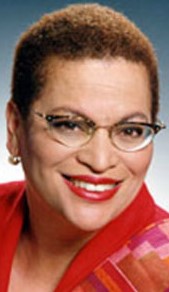
What does Claudine Gay mean to me

When Claudine Gay, Ph.D., was named the first Black President of Harvard University, and only the second woman, I was pleased.
Familiar with her record as Dean of the Harvard Faculty of Arts and Sciences, and aware of the rigorous process that narrowed more than 600 applicants or nominees to Gay, I felt that Harvard could not have selected someone more qualified.
Still, I was aware of the pitfall possibilities that Gay faced. Even before she assumed the Harvard Presidency, rabid racists questioned everything about her, from her research record, to her attitude. Following her inauguration closely, I was buoyed by her wide smile. Despite the racist invective, she was enjoying her job.
That didn’t last long. The witch hunt that had three female college presidents squirming under the hostile questioning of Gay’s disastrous testimony to Congress attracted even more criticism. And as the criticism reached a crescendo, Gay succumbed to the inevitable and resigned.
Would she have been able to do anything else? Her detractors had trashed her reputation. How could she possibly fundraise under those circumstances. Many talk of “presidential leadership” in the higher education context, but college presidents are also judged by their fundraising acumen. Many get a great boost in their first year when their support is greatest and enthusiasm for them is high.
By year two, they will be judged for what they’ve done “lately”. She didn’t get a clear first year, not even a clear few months. The attacks on her started as soon as she was selected and accusations of “anti-Semitism” were simply fodder in the culture wars.
The Presidents of Harvard, the University of Pennsylvania, and the Massachusetts Institute of Technology (MIT) could have handled Congressional questions more deftly. Or could they have? With the rabidly hostile Congresswoman Elise Stefanik (R-NY) bellowing “yes are no” at people accustomed to nuance, it seems that rising above the multisyllabic would have too complex for Stefanik, chasing TV instead of answers, to comprehend.
Of course, Gay should have begun her testimony by condemning the Hamas action of Oct. 7. For the likes of Stefanik it is irrelevant that more than 25,000 Palestinians have been murdered, including as many as 8,000 children. Israelis are celebrating the fact that a major Hamas leader is among the victims. Prime Minister Benjamin Netanyahu and his cronies say they will eliminate Hamas by whatever means necessary, no matter how many civilians are killed, starved, or displaced. Their lack of humanity, with their random airstrikes, is astounding.
Gay defended student free speech, even when it includes terms like “from the river to the sea,” which does not mean the elimination of Israel, but rather freedom for Palestine. It does not exclude the two-state solution, as Netanyahu has. Failing to condemn Palestinian free speech is not anti-Semitic. Criticizing Israel is not anti-Semitic.
Because she stood up for her students, her prior academic work was scrutinized and while Harvard found only “minor” errors in citations, the conservative press has chosen to blow them into academic malfeasance. Gay is guilty of nothing other than attempting to balance an uncomfortable tightrope that has less to do with so-called plagiarism than so-called anti-Semitism. It’s really about racism.
The campaign to topple Gay was led by Christopher Rufo, an anti-affirmative action, anti-critical race theory, anti-Black activist. He was joined by Bill Ackman, a billionaire hedge fund manager, and Harvard graduate and congresswoman Elise Stefanik. Ackman described Claudine Gay as “a diversity hire,” a stigma that too many Black men and women face when they are selected from a large pool.
Ironically, Ackman’s wife, former MIT professor Neri Oxam, is accused of plagiarism charges for more serious than Gay. Oxman lifted whole paragraphs from Wikipedia. Gay didn’t lift anyone’s work, she improperly cited some work. The Harvard investigation charged her with “academic malfeasance,” not quite grounds for sanctions. Lifting someone’s words is far more serious, ground for sanctions or more. Oxman should be viewed askance, especially given her husband’s stance against Gay, whose transgressions that she acknowledge. But Oxman is under the protection of her billionaire husband. The media has not gone after her with the same vitriol that they’ve gone after Dr. Gay.
The attacks on Gay make me want to surround her with support, to fight the injustice of everything, including racial invective that she has experienced. This is not about Claudine Gay or about Harvard. It’s about the culture wars and about anti-Blackness. Malcolm X once said “The most disrespected person in America is the Black woman. The most unprotected person in America is the Black woman. The most neglected person in America is the Black woman.”
Malcolm made this statement in the 1960s. Fifty years later, little has changed. Perhaps Gay had to leave her presidency. But she didn’t have to have the racist invective. And she didn’t have to be attacked with hostility. Gay’s ouster is personal to me and to many other Black women who experienced joy at her appointment, then horror and sorrow at the way she was treated.
Julianne Malveaux, Ph.D., a former college president, is an economist, author, and commentator. juliannemalveaux@aol.com.







